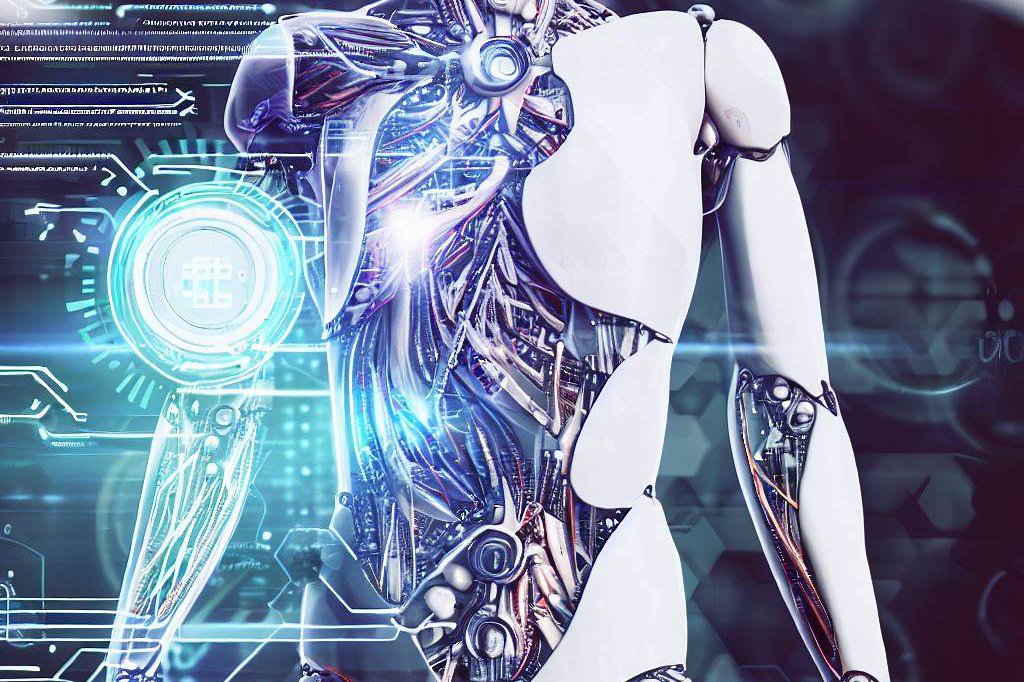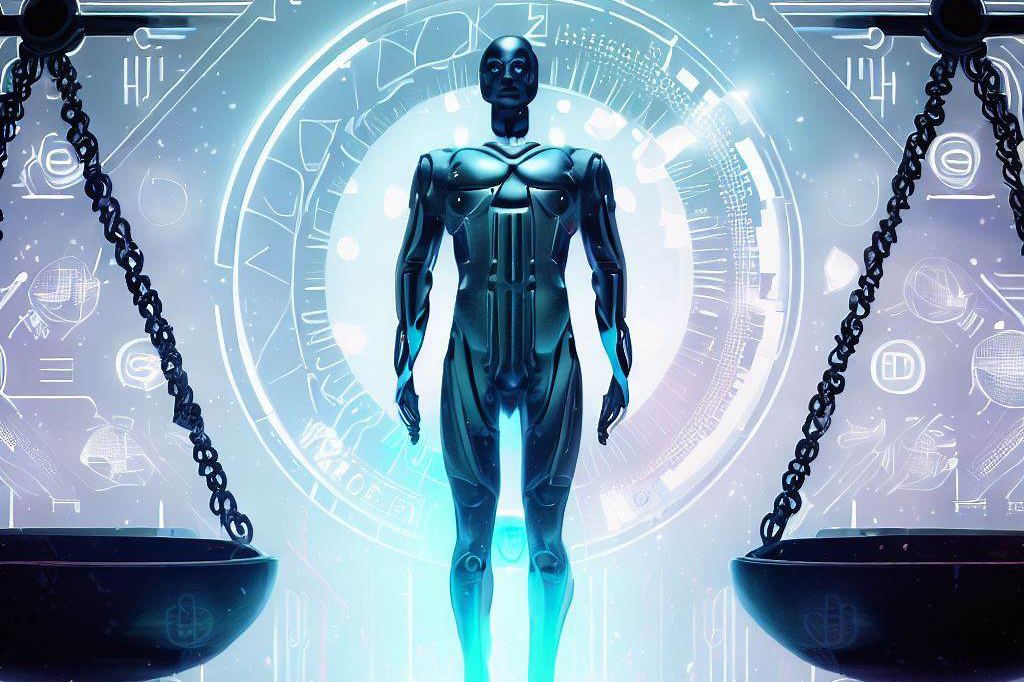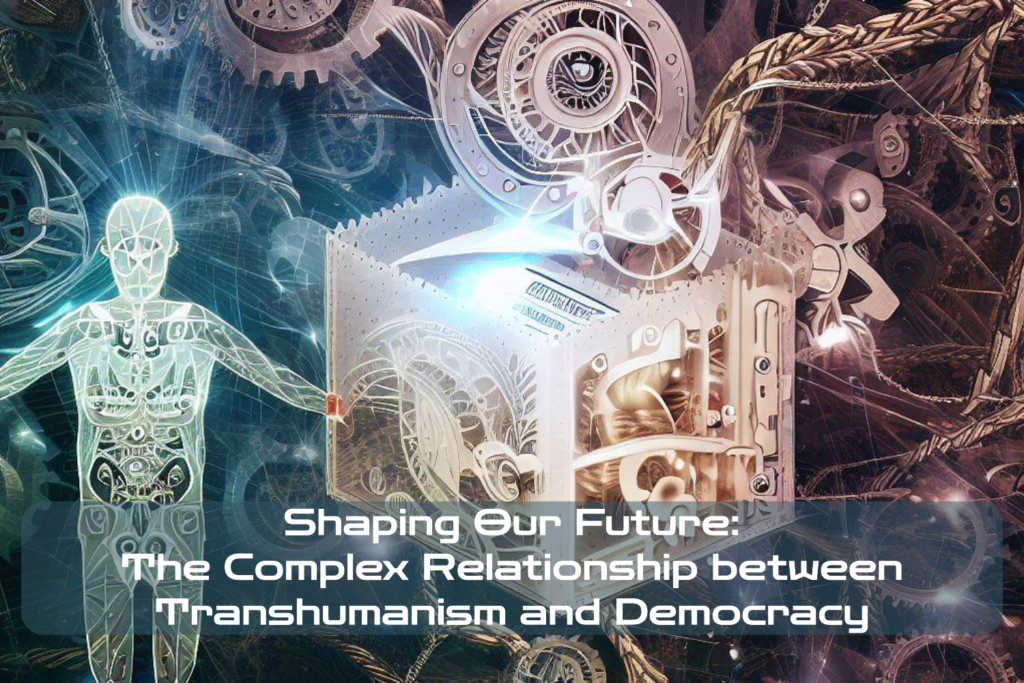Transhumanism and democracy are two concepts that have gained increasing relevance in recent years due to the rapid developments in technology and their impact on society. The broad definition of transhumanism is the use of advanced technologies to enhance human abilities, including physical, mental, and emotional capacities. Democracy is a political system that aims to ensure equal representation, participation, and protection of individual rights.
The intersection between transhumanism and democracy poses important questions about the future of political systems in light of technological advancements. As technology continues to evolve at a breakneck pace, it has become increasingly important to study this relationship in order to understand how it may affect our social structures.
Definition of Transhumanism and Democracy
Transhumanism is a movement that advocates using technology to transcend the limitations of humanity and improve upon what it means to be human. This includes using
- genetic engineering,
- brain-computer interfaces,
- artificial intelligence (AI),
- robotics,
and other advanced technologies.
The goal of transhumanists is to create a post-human future where humans can live longer lives with enhanced cognitive abilities.
Democracy is a type of government where power rests with the people who participate through voting or other forms of representation.
It is characterized by
- free elections,
- civil liberties,
- competitive political parties,
- independent media outlets,
- separation of powers between branches of government such as executive (e.g., President), legislative (e.g., Congress), judicial (e.g., Supreme Court).
The democratic system offers guarantees such as individual rights and protections against abuse by those who hold power.
Importance of studying the relationship between advanced technologies and political systems

The rapid advancement in technology has had significant implications for society as well as politics. As these technologies advance further into areas such as AI or genetic engineering, their effects on democratic systems will only increase. It’s therefore necessary that we study their impact on political systems.
A thorough understanding of the relationship between advanced technologies and political systems is crucial if we are to develop policies that can effectively regulate technological developments without infringing on individual rights. Furthermore, as technology continues to evolve, it will become increasingly important for democratic citizens and their representatives to be informed about the risks and benefits of new technologies so that they can make informed decisions about their use.
Studying the intersection of transhumanism and democracy is essential to developing strategies that ensure greater transparency, accountability, and participation in democratic processes. Only through this approach can we safeguard human rights while promoting technological progress.
The Concept of Transhumanism

Transhumanism is a philosophical and cultural movement that seeks to enhance human capabilities through the use of advanced technologies. It envisions a future in which humans can transcend their physical and intellectual limitations, ultimately achieving a state of post-human existence.
The key principles of transhumanism include the pursuit of life extension, enhanced intelligence and cognitive abilities, and the elimination of suffering. At its core, transhumanism represents an optimistic view of technology’s potential to improve human well-being.
Advocates believe that by harnessing the power of artificial intelligence, genetic engineering, and cyborg technology, we can overcome many of the challenges facing humanity today. For example, by developing personalized medicine based on an individual’s genetic makeup, we may be able to cure previously untreatable diseases or conditions.
Examples of Advanced Technologies that Support Transhumanist Ideals
Artificial intelligence (AI) is one technology that holds great promise for transhumanists. AI has already been used to develop intelligent robots and virtual assistants capable of performing complex tasks with high accuracy. In the future, AI could be used to enhance human intelligence by providing real-time information on any topic imaginable or augmenting our cognitive abilities through brain-computer interfaces.
Genetic engineering is another technology with immense potential for transforming human capabilities. By manipulating the genetic code, scientists have already created genetically modified organisms (GMOs) capable of producing valuable biopharmaceuticals or being resistant to environmental stressors.
In humans, genetic engineering could allow us to eliminate heritable diseases or even enhance desirable traits such as intelligence or athletic ability. Cyborg technology involves merging humans with machines in order to create new forms of being with enhanced abilities not possible for biological organisms alone.
Bionic limbs that mimic natural movements are already available commercially, but in future applications, there could be sensors implanted into bodies that translate senses such as touch into digital signals, effectively creating a new sense. The potential use of cyborg technology in the human experience is exciting and raises many questions about what it means to be human.
Overall, transhumanism offers a compelling vision of the future that seeks to harness advanced technologies to overcome many of the limitations we currently face as humans. While there are many ethical and societal challenges associated with these technologies, proponents argue that they provide opportunities for growth and progress that should not be ignored or dismissed out of hand.
The Concept of Democracy

Democracy is a form of government in which power is held by the citizens. It is characterized by free and fair elections, the rule of law, and the protection of individual rights and civil liberties.
The concept has evolved over time, with different forms of democratic systems emerging around the world. However, all democratic systems share some key principles.
Definition and Key Principles
At its core, democracy is based on the principle of popular sovereignty – that is, the idea that power should ultimately reside with the people. This means that citizens have a say in how they are governed through regular elections and other forms of public participation.
In addition to free and fair elections, key principles of democracy include: –
- The rule of law: All individuals are subject to the same laws, including those who hold positions of power.
- Protection of minority rights: Democracies are designed to protect individual rights and civil liberties even when they are not popular.
- Separation of powers: The executive branch (e.g., president) enforces laws; legislative branch (e.g., parliament) makes laws; judiciary branch (e.g., courts) interprets laws independently.
Examples of Democratic Systems in Practice
There are different types of democratic systems in practice around the world.
Direct democracy allows citizens to vote directly on issues themselves rather than through elected representatives.
Switzerland uses direct democracy for various issues, where citizens can vote via referendum or popular initiative on any matter proposed for federal lawmaking.
Representative democracy uses elected officials to represent the interests or views held by their constituents.
In this system, voters elect representatives who make decisions on their behalf in parliaments or congresses like Canada’s parliamentary system or the USA’s congressional system, where elected officials write and vote on legislation for their countries while representing their constituents’ views.
Democracy has been an important form of government for centuries, providing citizens with a voice in how they are governed.
Different democratic systems have emerged around the world, each with its own strengths and weaknesses. Nevertheless, democracy remains an essential element of any modern political system that balances and protects individual rights and liberties.
The Impact of Advanced Technologies on Democratic Systems

Potential Benefits
As advanced technologies continue to evolve and become more prevalent in our society, there are several ways in which they could positively impact democratic systems.
One potential benefit is increased efficiency in government operations. For example, automation and machine learning algorithms can be used to streamline administrative tasks, reducing the time and resources required for routine processes.
This efficiency can save tax dollars and increase the speed at which decisions are made.
Another potential benefit is greater access to information.
The internet has already revolutionized the way we communicate and share information, but advanced technologies like artificial intelligence and virtual reality could take this even further. AI-powered systems could help citizens navigate complex government processes or analyze vast amounts of data for decision-making purposes.
Virtual reality technology could enable citizens to visualize policy proposals or participate in civic debates from anywhere in the world. Advanced technologies have the potential to improve citizen engagement with democratic systems.
Online voting platforms, for example, could increase voter turnout by making it easier for people to participate in elections from their computers or mobile devices. Social media platforms can also facilitate greater citizen participation by providing a forum for dialogue between voters and elected officials.
Potential Drawbacks
Despite these potential benefits, there are also several ways that advanced technologies could negatively impact democratic systems if left unchecked.
One concern is loss of privacy— as governments collect more data on citizens through social media monitoring or facial recognition technology, there is a risk that this data could be used to infringe upon individual rights or suppress dissenting opinions.
Another concern is unequal access to technology— as some groups have greater financial resources than others, there may be disparities in access to cutting-edge technologies that give certain groups an unfair advantage over others in influencing political outcomes.
Some argue that reliance on technology may lead to a decrease in critical thinking skills or a lack of engagement with the democratic process. For example, if citizens rely too heavily on AI systems to make decisions for them, they may become less informed about the issues and less invested in political outcomes.
Transhumanism and Its Potential Impact on Democratic Values

How Transhumanist Ideals May Conflict with Traditional Democratic Values (e.g. Equality, Individual Liberty)
Transhumanism is a movement that aims to use advanced technologies to enhance human capabilities beyond their existing biological limits. This includes the use of artificial intelligence, genetic engineering, and other technologies to improve mental and physical abilities.
While this may seem like a noble goal, transhumanist ideals can conflict with traditional democratic values such as equality and individual liberty. For example, if some individuals have access to advanced technologies that give them an unfair advantage over others who cannot afford or access those technologies, it could lead to a greater divide between the haves and have-nots in society.
This would go against the principles of equality that are at the core of most democratic systems. Furthermore, if individuals are able to enhance themselves through technology beyond what is considered “normal,” it could challenge traditional notions of individual liberty.
For example, if someone has enhanced cognitive abilities through brain implants or other techniques, do they still have free will? How does this impact their ability to make choices and decisions about their own lives?
The Role of Government in Regulating the Use of Advanced Technologies in a Democratic Society
Given these potential conflicts between transhumanist ideals and democratic values, it is important for governments to play a role in regulating the use of advanced technologies. One approach could be to create laws or policies that ensure equitable access to these technologies for all members of society. This could include providing subsidies or other incentives for individuals from lower-income backgrounds to access these technologies.
Another approach could be to establish ethical guidelines for the development and use of advanced technologies in order to prevent potential abuses. This could involve creating regulatory bodies responsible for overseeing research in these areas.
It is also important for governments to engage citizens in discussions about the use of advanced technologies and how they may impact democratic values. Through public consultation and engagement, policymakers can better understand the concerns and perspectives of citizens, and ensure that the development of advanced technologies is aligned with democratic principles.
While transhumanism offers exciting possibilities for enhancing human capabilities, it is important to consider its potential impact on traditional democratic values such as equality and individual liberty. Governments play an important role in regulating the use of these technologies to ensure that they align with democratic principles.
Case studies: Examining the intersection between transhumanism and democracy
China’s Social Credit System: A Transhumanist Nightmare?
One of the most well-known examples of advanced technologies influencing political systems is China’s Social Credit System. The system assigns a score to every citizen based on their behavior. This score takes into account a range of factors, including financial responsibility, social behavior, and even online activity.
Those with high scores are rewarded with access to better services and opportunities, while those with low scores face penalties such as restricted travel or limited purchasing power. While proponents argue that the system will improve societal trust and promote positive behaviors, critics point out that it gives the government unprecedented power over citizens’ lives.
Additionally, there are concerns about transparency and the potential abuse of the system by those in positions of power. From a transhumanist perspective, the Social Credit System represents both an opportunity and a threat.
On the one hand, it incorporates advanced technologies such as facial recognition and big data analysis in ways that could be seen as enhancing human abilities. On the other hand, it raises questions about individual autonomy and privacy rights—core values of democratic societies.
The Prosthetics Paradox: Enhancing Abilities or Creating Inequity?
Prosthetic limbs have been used for centuries to help people with physical disabilities overcome their limitations. With recent advances in materials science and robotics technology, however, prosthetics have taken on new levels of sophistication—and controversy.
On the one hand, these devices offer tremendous benefits to users in terms of increased mobility and independence. At the same time, they raise difficult ethical questions around fairness and equity.
Wealthy individuals who can afford high-end prosthetics may gain significant advantages over those who cannot—not just in terms of physical abilities but also potentially in terms of employment opportunities or access to education. From a democratic perspective, these issues raise fundamental questions about what it means to be equal members of society and how to ensure that technology benefits everyone, not just the privileged few.
Analysis of the Impact on Democratic Values and Institutions

Ensuring that Technology Enhances—not Undermines—Democracy
As we have seen, advanced technologies have significant potential to both enhance and undermine democratic values and institutions. In order to harness the benefits of these technologies while mitigating their risks, it is important for governments and other stakeholders to take proactive steps.
This might involve investing in education and training programs around emerging technologies, promoting transparency and accountability in their use, or developing regulatory frameworks that balance innovation with social responsibility. It may also involve engaging citizens in conversations about what kind of society they want to live in—and how technology can help us get there.
Ultimately, the relationship between transhumanism and democracy will be shaped by a complex interplay of factors—including technological progress, political dynamics, economic conditions, cultural norms, and more. By exploring this relationship in depth through case studies like those discussed above—and by engaging in ongoing dialogue around these issues—we can work towards building a future where technology supports democracy rather than undermining it.
Final Thoughts: Balancing Technological Progress with Democratic Values

The Importance of Finding a Balance
As advanced technologies continue to develop at an unprecedented rate, it becomes increasingly important to consider the impact of these technologies on our democratic values. While some may view transhumanist ideals as a way to improve our lives and enhance human potential, it is crucial that these advances do not come at the expense of democratic principles such as equality, individual liberty, and privacy.
In order to strike a balance between technological progress and democratic values, it is essential that government regulation keep pace with advancements in technology. This will require ongoing discussions between policymakers, scientists, and civil society groups to ensure that the development and use of advanced technologies aligns with democratic values.
Opportunities for Collaboration
Despite potential conflicts between transhumanism and democracy, there are also opportunities for collaboration. For example, incorporating public input into the development of new technologies can help ensure that advancements are made in a way that benefits everyone. Additionally, transhumanism could provide new ways for individuals to participate in democracy through increased access to information or enhanced means of communication.
It is important to approach this discussion with an open mind and recognize that there may not be one clear answer. Instead, we must continually assess the impacts of new technologies on our democratic institutions and make adjustments accordingly.
An Optimistic Outlook
While finding a balance between technological progress and democratic values may seem daunting at times, there is reason for optimism. As societies become more aware of the potential impacts of advanced technologies on our lives, there is growing momentum towards creating ethical frameworks around their development and use.
By working together across disciplines and national borders, we can ensure that technological progress does not come at the expense of our most cherished democratic values. With careful consideration and collaborative efforts towards these goals, we can create a future that benefits all members of society.

C M, a seasoned editor, journalist, and consultant, is deeply fascinated by the convergence of technology, space, and the future of humanity.
With a particular interest in transhumanism, futurology, and the philosophical and ethical dimensions of these domains, C M serves as the lead contributor to TranscendSphere and SpaceSpotlight.
When not penning insightful articles on these rapidly evolving fields, C M indulges in their love for podcasts and books, proudly embracing their status as a ‘Happy Nerd Extraordinaire!’





